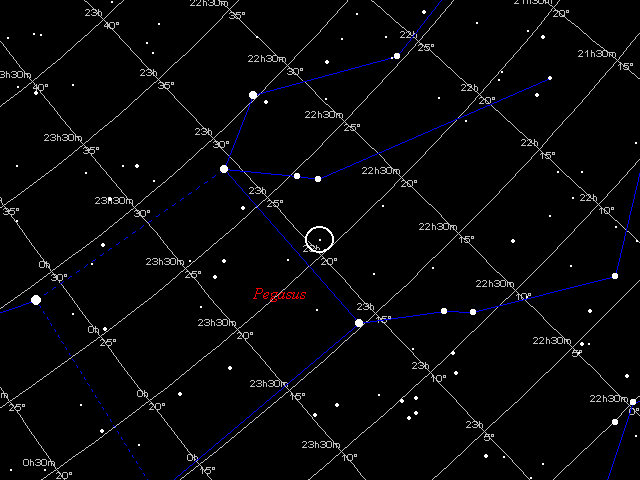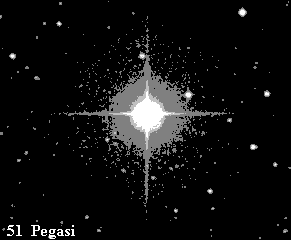
 The star 51 Pegasus seems to have a "groupie" -- a planet at
least half the size of Jupiter and only 40 light-years away from Earth.
The announcement of the discovery by Swiss astronomers met with some
skepticism, but was confirmed by two American astronomers at the Lick
Observatory near San Jose, California. The planet was detectable
because of its slight but irregular wobble in the motion of 51 Pegasus.
This discovery is important not only scientifically but also
philosophically as it challenges the notion that our solar system is
singular in existence.
The star 51 Pegasus seems to have a "groupie" -- a planet at
least half the size of Jupiter and only 40 light-years away from Earth.
The announcement of the discovery by Swiss astronomers met with some
skepticism, but was confirmed by two American astronomers at the Lick
Observatory near San Jose, California. The planet was detectable
because of its slight but irregular wobble in the motion of 51 Pegasus.
This discovery is important not only scientifically but also
philosophically as it challenges the notion that our solar system is
singular in existence. Scientifically, the planet has many interesting peculiarities. The newly-identified planet completes it orbit around 51 Pegasus once every four days, compared to the shortest planetary orbit in our solar system of 88 days belonging to Mercury. The star 51 Pegasus is 8 billion years old, 3 billion years older than our sun. The planet is 5 million away from its star, which is only one twentieth of the Earth's distance from the sun. The close proximity of the planet to its star keeps its temperature at a sweltering 1255 Kelvin. Some astronomers believe this this high temperature may have long since driven off any hydrogen in the planet's atmosphere.
Dr. Geoffrey Marcy, an astronomer at San Francisco State University, and Dr. Paul Butler, a researcher at the University of California at Berkely, will return to Lick Observatory for 10 consecutive nights for further observation of 51 Pegasus in order to help refine their understanding of the planet's orbit and mass. They also want to search for the possible presence of other planets in the same system.
In the past, dead stars presented the only accepted evidence for planets beyond our solar system. These are certainly inhospitable to life, as is the planet in orbit around 51 Pegasus due to its close proximity to its star. American astronomers David Latham and Robert Stefanik have found evidence that a second planet circles 51 Pegasus farther out, but the precise orbit and mass of the planet have not yet been determined. The discovery of new planets is important because the likelihood that there are many other planetary systems increases the chances of there being life -- perhaps intelligent life -- somewhere else in the universe.

 |